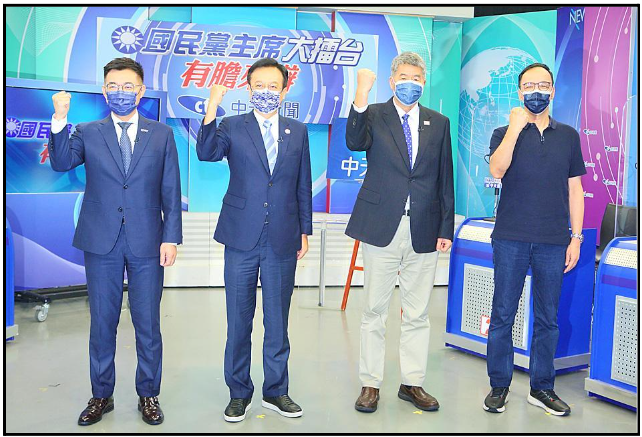Following a period of reduced tensions in the Taiwan Strait during the Ma Ying-jeou (馬英九) administration (2008-2016), much uncertainty surrounded the future of cross-Strait relations after the election of Tsai Ing-wen (蔡英文) of the Democratic Progressive Party (DPP) in January 2016. Two months prior to that election in November 2015, Ma and his counterpart, Chinese Communist Party (CCP) General Secretary Xi Jinping (習近平), had met in a historic summit in Singapore, leading some analysts at the time to ponder whether the mostly symbolic meeting could yield something more substantial. The brief interaction between the two party leaders did not help the then-ruling Chinese Nationalist Party (Kuomintang or KMT) in the January elections, in which Ms. Tsai not only scored a major victory against her opponent but her party, the DPP, obtained a majority of seats in the Legislative Yuan for the first time in the nation’s democratic history. From Beijing’s perspective, following eight years of rapprochement, the outcome of the elections could only have been construed as a repudiation of its “goodwill” and a rejection of “one China” under the “one country, two systems” formula. Although Beijing would never admit it, the result also made it difficult for the CCP to continue to claim that only a limited number of DPP “separatists” opposed the “historical inevitability” of “peaceful unification.” Consequently, Beijing has embarked on a systematic hardening of its rhetoric and actions toward Taiwan.
First Hardening: 2016
In the months between the election and inauguration on May 20 of that year, it was possible to hope that relations between Taipei and Beijing could remain on a somewhat even keel. On the Taiwan side, Ms. Tsai extended an olive branch of sorts, offering to abide by the “status quo” in the Taiwan Strait—at some cost to her within the pro-Taiwan green camp—and the Republic of China (ROC) “constitutional order.” Furthermore, although the incoming president refused to recognize the so-called “1992 Consensus,” she nevertheless committed to respecting and building upon the “historical fact” of a meeting that had occurred between the two sides in 1992 and avoided rhetoric which risked inflaming the relationship. On the Chinese side, meanwhile, a number of respected Chinese academics, including Zhang Nianchi (章念馳) of the Shanghai Institute for East Asia Studies—the intellectual heir to former Association for Relations Across the Taiwan Straits (ARATS) chairman Wang Daohan (汪道涵)—suggested in interviews with foreign media that constructive and peaceful relations in the Taiwan Strait should be possible without the “1992 Consensus.”
As President Tsai gave her inaugural address on May 2016, there was a chance that Beijing could agree to a new framework under which cross-Strait relations could continue to evolve. Within six hours, however, the rhetoric in Beijing hardened significantly: President Tsai’s signals had been an “incomplete test paper.” No sooner had the State Council’s Taiwan Affairs Office (TAO) expressed its disagreement than official channels of communication between the two sides, the TAO and Taiwan’s Mainland Affairs Council (MAC), were suspended. What followed were four years of a gradually hardening rhetoric against Taiwan, ramped up political warfare activities, economic and military coercion, as well as the resumption of efforts to poach Taiwan’s official diplomatic allies. Alongside these aggressive measures, Beijing nevertheless attempted to win over Taiwan’s youth and highly educated professionals through “incentive programs” meant to lure Taiwanese talent to China.
As Beijing’s animosity became more apparent, so too did President Tsai’s willingness to challenge China in her own rhetoric, often making her one of the very few heads of state to openly criticize Beijing for its human rights violations and excesses in Hong Kong.
Beijing then appeared to have gotten a break when, in the November 2018 local elections, President Tsai’s DPP suffered a major setback, losing control of a number of municipalities. The poor results prompted President Tsai to step down as party chair and led Beijing to interpret the outcome as a sign of renewed public support for “peaceful unification” and a rejection of President Tsai’s overall China policy. Moreover, in Kaohsiung, the elected KMT candidate, Han Kuo-yu (韓國瑜), emerged as a new, populist force in a hitherto moribund KMT and rode a wave which eventually took him to directly challenge President Tsai in the January 2020 elections.
Second Hardening: 2020
President Tsai’s re-election in 2020, with a record-breaking 8 million votes—along with her party’s ability to maintain a majority, albeit reduced, in the legislature—sealed the deal on Beijing’s hopes for the KMT to prove itself as a partner in its ambitions for unification. By then, it had become evident that all efforts to weaken President Tsai had been in vain and, in fact, had probably backfired.
But there had already been signs along the way, suggesting that the CCP only halfheartedly believed in “peaceful unification” and the effectiveness of economic incentives in winning over a sufficiently large number of Taiwanese. As early as January 2018, People’s Liberation Army (PLA) Major General Zhu Chenghu (朱成虎), a military strategist and former dean of China’s National Defense University described by the Washington Post as one of China’s leading military minds, that the KMT was simply no longer committed to unification and had become unreliable as a partner. Members of the KMT who visited China, he said, were doing little more than “lying, eating, and drinking.”
Xi’s tone-deaf address to “Taiwan compatriots” in January 2019 also demonstrated, inter alia, that Beijing was in no mood to negotiate and that unification, under the by-then-unviable “one country, two systems,” was the only option. By then, it had become clear that the wishes of the Taiwanese, if they ever were to be taken into consideration, were no longer relevant. Xi also stated that the use of force against Taiwan remained an option for Beijing. Then, on December of that year, Wang Hongguang (王洪光), a hawkish retired lieutenant-general, told a forum organized by the Global Times in Beijing that young Taiwanese no longer identify as Chinese and desire independence. “The ‘independent forces’ are now the majority in Taiwan and this has become an irreversible trend,” Wang was quoted by the South China Morning Post as saying. “In addition, public opinion on the mainland and Taiwan is moving in opposite directions and getting further and further apart. Time is running out and it will be an unaffordable burden for both sides of the Taiwan Strait if we have to wait another five to 10 years for us to liberate or reunite with Taiwan,” he said, adding that “‘one country, two systems’ is unable to land in Taiwan and the window for peaceful reunification is closing.”
By then, the voices of moderation in Chinese academe, such as had existed in 2016, had been entirely silenced and gradually replaced by more hardline and vocal proponents of the forced unification of Taiwan. To them, Taiwan’s resistance was an affront, a refusal to subscribe to a Sino-centric hierarchical construct that puts the “peripheries”—societies like Taiwan, Hong Kong, Tibet, and Xinjiang—in a subject position vis-à-vis the “center” in Beijing. It was an unforgivable rejection of the so-called “China dream” by a people that should know better.
Equally worrying for Taiwan was the evidence that outside CCP organs, Chinese nationals who are not necessarily party members were also beginning to adopt a much harder tone toward Taiwan, with a higher frequency of genocidal terms and calls for the complete annihilation of the island and its people (e.g., 留島不留人, or “seize the island and get rid of the people;” another variant of this phrase leaves only birds alive). Such rhetoric spiked in early 2020 and, according to preliminary research, its propagation may have been assisted by the use of bots on social media. The extent of state or party involvement in coordinating this rhetorical escalation remains to be determined, but it leaves no doubt that the nationalism that the CCP has been cultivating since the early 1990s has now to some extent reached ultra nationalistic levels both among CCP members and within Chinese society. Although not every Chinese citizen ascribes to such language, hardline voices have arguably gathered enough momentum on social media that it could be difficult for the Chinese government to de-escalate in a time of crisis, such as, for example, a military collision in the Taiwan Strait.
Tumultuous Road Ahead
Following an extensive propaganda campaign in recent weeks that has sought to rewrite the history of COVID-19 and to portray China as being in a stronger position internationally as the rest of the world struggles to contain the virus, this ultranationalist sentiment could compel the Chinese leadership to seize the opportunity to take military action against Taiwan. The desirability of such a move will inevitably also be predicated on whether Beijing interprets signals from the United States, such as the recent decision to remove all its heavy bombers from Guam, as signs of “weakness” and strategic retrenchment.
Conversely, the prospect of a beleaguered Xi tapping into this ultranationalist sentiment to bolster his credentials and wrong-foot his opponents is difficult to ignore. There is a possibility that Xi has been weakened due to his government’s ineffective early response to the COVID-19 pandemic. Government sources have also suggested that rival factions within the CCP may be considering options for Xi’s removal had he not made himself president for life (his second term was expected to end in 2022). If and once those ultranationalist forces are unleashed, such vitriolic sentiment could make it very difficult to maintain control, which is an invitation for excess and, indeed, potentially genocidal action against the stubborn Taiwanese.
With President Tsai and Taiwan receiving unprecedentedly favorable attention from the international community and the possibility that neither the KMT, which has yet to regain its footing and sense of direction, nor any alternative party will be in a position to challenge the DPP in the 2024 elections, Beijing may be running out of patience. The voices of moderation within China have been silenced, while those calling for radical action are taking up most of the bandwidth. Ostensibly having given up on wining the hearts and minds of the Taiwanese, the CCP and the ultranationalists that it has cultivated may decide that the time has come for Taiwan to be “taught a lesson.”
Given the tone of the recent rhetoric, the outcome of a radical action by China could be a terrible one for Taiwan. At the very least, we can expect an intensification of political warfare efforts to undermine, polarize, and weaken Taiwanese society and subvert the ability of the central government to run the country. A more radical course of action would be the use of military force. As such, Taiwan and its allies must continue to present a credible deterrent and avoid any possibility of miscalculation on Beijing’s part.
The main point: Frustrated at every turn in its efforts to annex Taiwan by “peaceful” means, the CCP and the ultranationalists it has cultivated have adopted much harsher rhetoric toward Taiwan recently, with a worrying spike in genocidal terminology.



